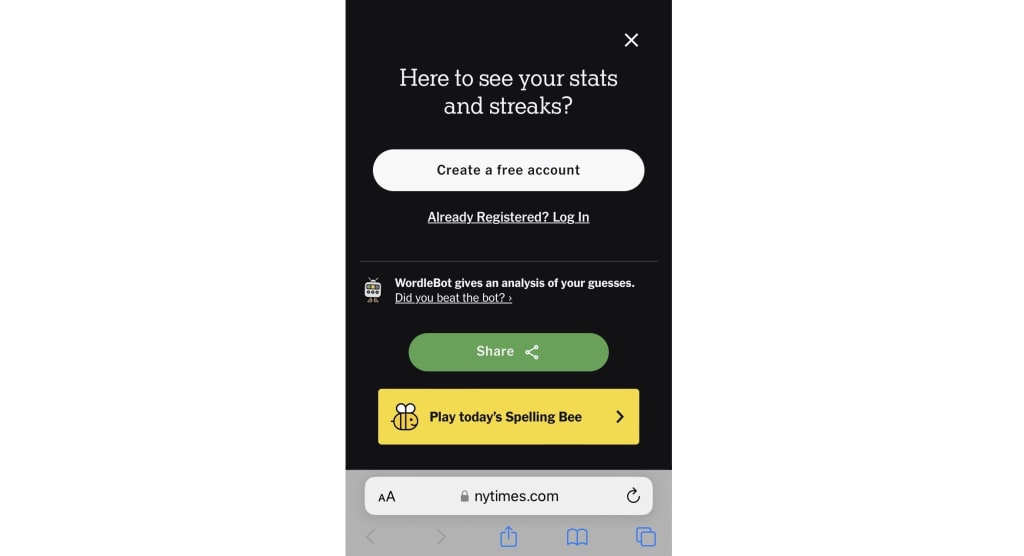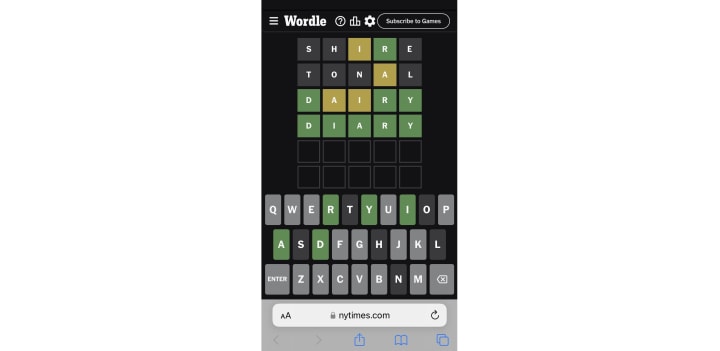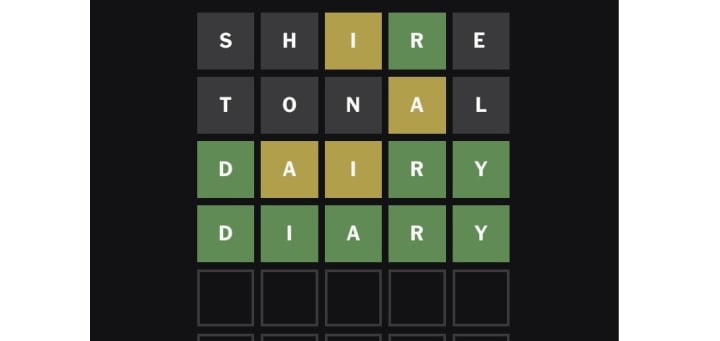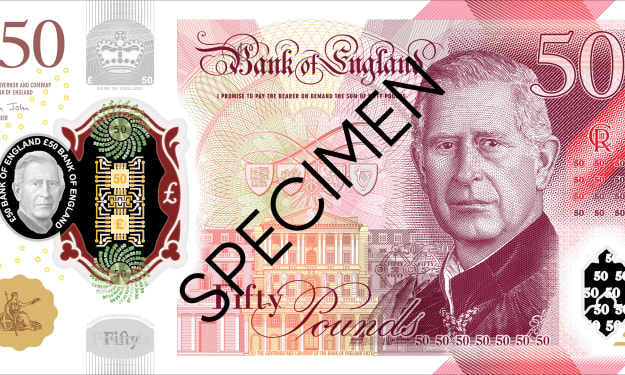Saved by a data grab
Oh the joy of the online game

Ever been hoodwinked into giving up your personal data in return for a bogus or dubious free offer? Haven't we all! Not this time, I said. This time, I said "NO", refused to 'register' for free access to Wordle stats, and benefitted hugely by doing so. How did this happen?
Well, last year, I was introduced to the NYT online game Wordle. I was introduced to the game by a friend who was in hospital awaiting an operation and was thoroughly bored. He started to play the game with his partner, when she visited him, to while away some time together. They didn't take it too seriously.
Did you know?
The US has one of the least regulated data markets in the world? Land of the free, it may be, but that leaves the average US citizen more vulnerable to online data grab, whether by responsible organisations or by crooks and scammers. I intend no criticism, I am merely wary of registering my personal data with any US-based operation.
The European Union, on the other hand, has the most regulated data market in the world. All EU-based data controllers must abide by the EU General Data Protection Regulations (GDPR in the UK) in addition to any domestic laws. Even though the UK is no longer a member of the EU, it retains the GDPR otherwise it would not be able to provide data services to EU member states.
When I took up the game, I played it pretty much every day. Sometimes at the stroke of midnight when the new game appeared, often when I woke up in the morning and had my first mug of hot, black, reviving tea in bed. Like most players, I imagine, I wanted to crack the code in as few guesses as possible. Like many, I wanted to build a good winning streak.
Occasionally, I was reset back to 1 by not guessing the word but, frustratingly, I also saw a surprise result of 1, which I quickly discovered was by not remembering to do the Wordle that day. I still carried on and even managed a winning streak of 87 before I slipped up. Again, not by not getting the word, but by missing my daily Wordle fix.

From then on, I was determined to reach the magical number of 100 unbroken wins to achieve my personal best Wordle winning streak. But I kept slipping up in the 30s or 40s, sometimes less. Never mind, I refined my technique and paid better attention to checking I hadn't missed a game as I settled down in bed with my current reading book (Kindle) on my phone.
Then it happened. The bastards! NYT cut access to daily winning stats unless you registered. BASTARDS! I'll be damned if I will register, just to know my score, so I carried on, without stats, to enjoy my daily Wordle. But I have to admit. Something is missing.
Why am I bothered about registering?
Well, let's face it, we have no choice but to register our details to obtain certain services and benefits. Online banking being an obvious one. But we trust our bank, right? What about other online offers? It's not just about giving away personal data, it's the time and tedium involved in completing online fill-out forms. I hate it! I have always had a problem with form filling, it's part of my DNA. But the more I use 'online' the more I get pissed off with 'free' services that demand registration.
Still working to a personal challenge of achieving that sequence of 100 unbroken wins, I now take a note of the last time I was zeroed. If I fail to get the word right on any day, I note down the date of my next win (hopefully the following day) so that I can count back my winning streak to this date if I want to.
What do I care about Wordle stats? I don't really, and being freed from this particular 'interest' helps me to enjoy the puzzle whenever I want to play. Already, I have benefitted from this bit of aggressive marketing on the part of New York Times. Yet there is more. No longer will I lose my streak if I forget to play one day. If I forget, it will seem to me an unbroken record and that is how I will treat it. I have effectively adjusted the rules to suit my playing patterns.
Want to know how to up your game?
Here is a player tip for any who care to try it. Instead of making an initial guess at a word, then using any correct and incorrect letters and positions to build up a word from further guesses, try this. Having made your first guess and seen the results, use a completely different word, ignoring any correct letters and positions.

This will allow you to check out a list of up to 10 of the most frequently used letters in the English language. In the above example, the words SHIRE and TONAL have been used. A different word was used for the second guess even though SHIRE produced one correctly placed letter (R) and one incorrectly placed correct letter (I). By following with TONAL, three frequently-used letters were found (A, I and R), including R in the correct position.
Adding D to Y to give DAIRY indicated that the correct word could only be DIARY. The first two words in this attempt also used four vowels, leaving only U out. Had none of the vowels been correct, it would have meant that U would almost certainly be needed.
Most frequently used letters in order:
E A R I O T N S L C U D
Why not give it a go?
About the Creator
Raymond G. Taylor
Author based in Kent, England. A writer of fictional short stories in a wide range of genres, he has been a non-fiction writer since the 1980s. Non-fiction subjects include art, history, technology, business, law, and the human condition.






Comments (4)
Good work on this article. I am not really that into these kinds of games. The only one I do is Word Blitz on Facebook when I remember.
I never thought much about registering. I did it even without thinking hahaha. Mike and I always share our results with each other. Apart from Wordle, I play many other once a day games as well
Great article. I registered without thinking. I'm usually careful about these things. One I will not use is Teemu, they sell your data to a very long list of clients.
Great story and Wordle hack, Ray! It figures that the US is bottom-feeding in providing security in data markets.